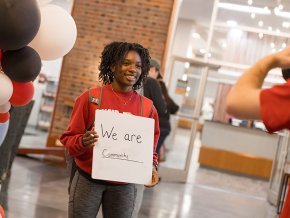Alumna recognized by N.C. Attorney General

LR alumna Amy Upham was recognized by the attorney general of North Carolina for her work combatting the opioid crisis in Buncombe County.
Lenoir-Rhyne University doesn't want its students to just get by. It wants them to find their passion, find their calling and strive to make a difference.
Alumna Amy Upham '19 has been recognized by North Carolina Attorney General Josh Stein with a Dogwood Award for the difference she's making as the opioid response coordinator for Buncombe County Health and Human Services.
Dogwood Awards are presented annually to North Carolinians who are dedicated to keeping people safe, healthy and happy in their communities, according to the North Carolina Department of Justice.
"She is well deserving of this recognition," said Dr. Kimberly Price, associate professor in the Master of Public Health program at LR. "The work that she is doing to mitigate the opioid crisis in our community has taken diligence, collaboration across sectors and passion."
A New York native, Upham relocated to Asheville, North Carolina seven years ago.
A veteran behavioral health specialist, she had spent several years advocating for under-represented populations both in New York and North Carolina. Upham helped secure housing and benefits for those in need. She worked as an anti-stigma coordinator and tirelessly advocated for mental health reform.
However, after more than a decade, she sought a way to make a bigger impact.
"I was seeing a need for the work to get bigger," she said. "I wanted to do more for people. I love medicine, and I loved working on the streets in communities helping folks who are homeless or marginalized by getting them help they needed. But that was 1-on-1, and I wanted to make an impact more on a macro level. I wanted to do policy and programming work."
And that led her to the MPH program at LR.
"Amy was not only a top student, she brought such depth of understanding to her projects from epidemiology and Lyme disease to program planning for harm reduction practices in western North Carolina," Price said. "She is a hard-working, enthusiastic and highly intelligent person. She has shown initiative, critical thinking skills, leadership and passion for her work in class. She is gifted with the ability to apply academic frameworks to real-world issues and has excellent communication skills."
Upham joined the health department prior to her graduation as a subcontractor before moving into her current position.
"It was actually a temporary position at first with no guarantee that I would have anything afterward," she said. "But people needed access to treatment, and we needed a more robust crisis response, so I started applying for grants."
Since 1999, more than 760,000 people have died due to drug overdose, according to the U.S. Department of Health and Human Services. Two out of every three drug overdose deaths in 2018 involved an opioid.
Buncombe County received two of the grants Upham applied for, which resulted in more than $1 million earmarked to form a re-entry linkage to care program and post overdose response team, as well as collaborate with departments such as Emergency medical services, Register of Deeds and Buncombe County Sheriff's Office to create processes aimed at tracking and preventing overdose death.
"We now have a team that, within 72 hours after an overdose, responds to offer counseling, pier support and referrals," Upham said. "Within the grant, we identified funds we can use for housing and specifically for recovery and medicine assisted treatment."
Unfortunately, like many other industries, Upham's job has been made more difficult due to the COVID-19 pandemic.
"Across North Carolina right now, the state has seen a 24 percent increase in emergency department response to overdose," she said. "It's pretty common. People are in isolation and dealing with depression. In addition, narcotics aren't as easily accessible, which can lead to homemade drugs being tainted with fentanyl.
"Buncombe County is actually the only county in the state — that I've seen — that has seen a reduction in emergency department visits due to overdose. We've actually seen a 10 percent reduction, which is a 34 percent difference. That's a large margin of difference for a county that was once the overdose hot spot in North Carolina."
Upham also manages a syringe services program at the health department and oversees CareReach's Hepatitis C Bridge Counseling program.
"I'm getting to help design programs, which is exactly what I wanted to do," she said. "I think folks don't understand how much science and work is behind programing. You need to convene stakeholders, manage budgets, write grants, create processes and policies and evaluate implementation and outcome metrics. I don't think I could have done all of that effectively and quickly without the MPH program."

The Bear community came together for the seventh-annual Bears Give Back event and raised a record-setting $847,320 to support current and future students.
View More
Lenoir Rhyne celebrates the success of Giving Tuesday, an annual global giving movement for the causes and organizations we care about most.
View More